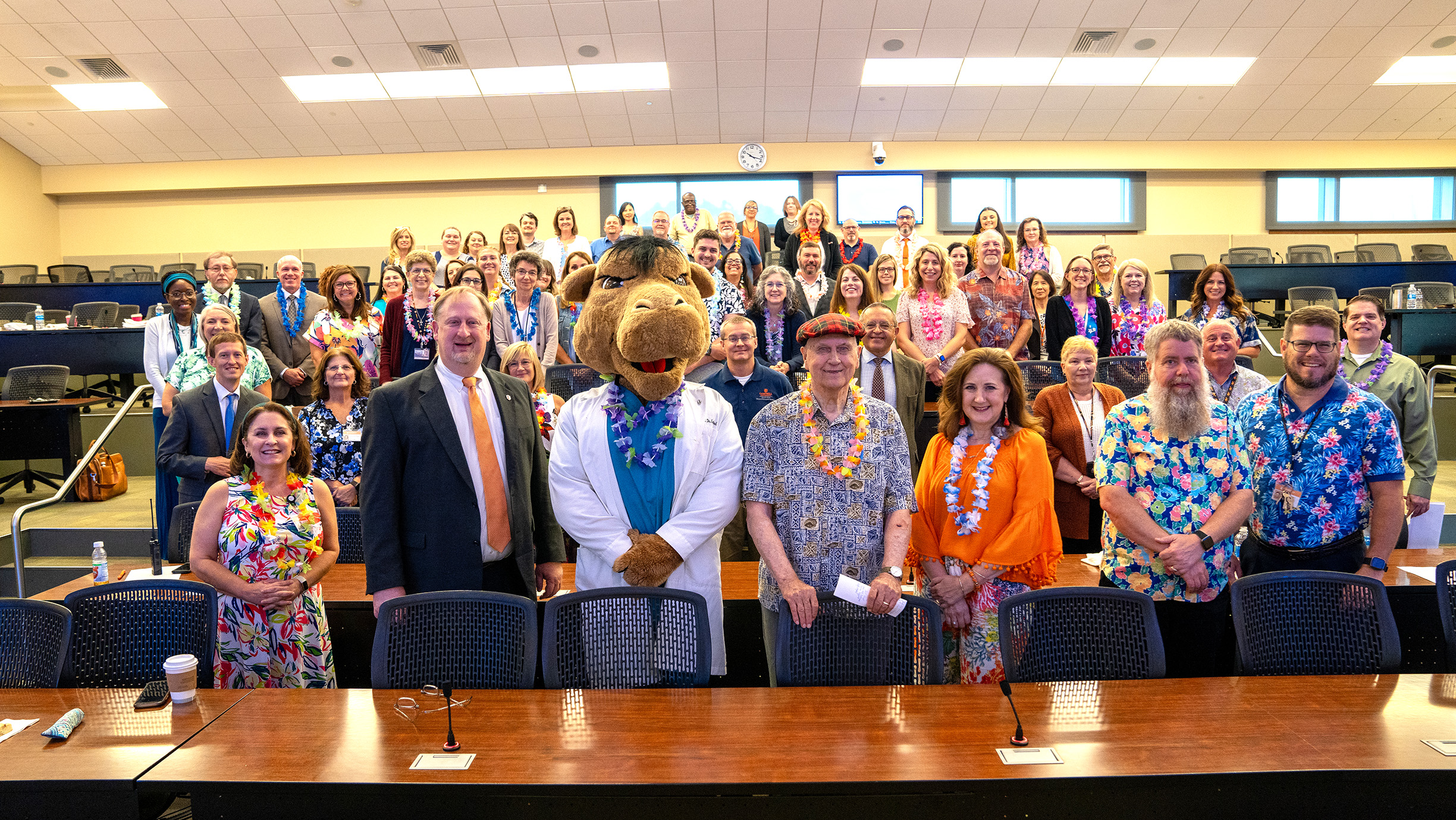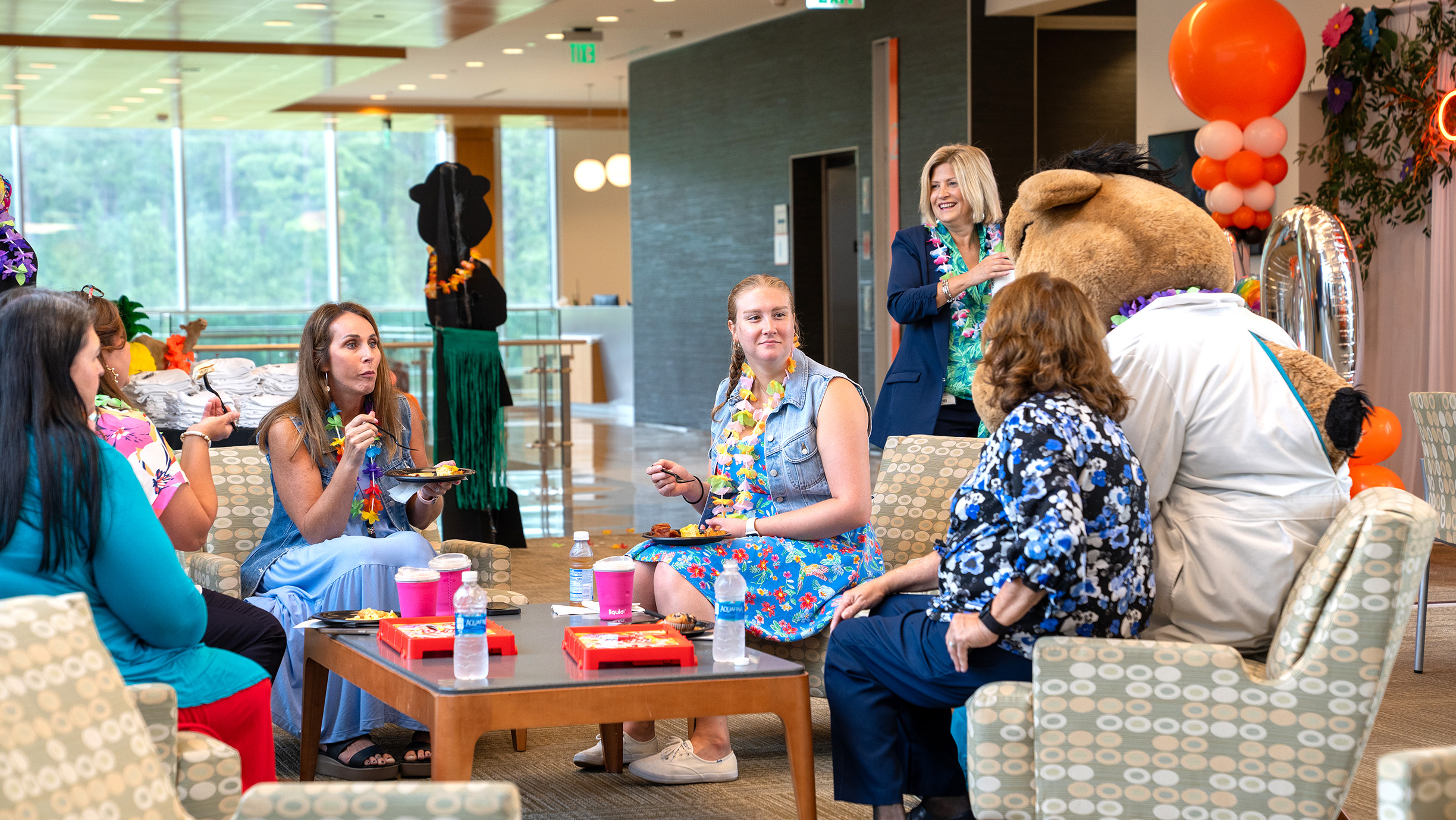At 88 years old, former Campbell University President Jerry Wallace can still captivate a room. And his message to the faculty and staff of the School of Osteopathic Medicine that bears his name during a breakfast Monday commemorating the 10th anniversary of the school’s opening was — like any good Baptist sermon — a mix of storytelling, inspiration and, most importantly, a sincere call to action.
A Hawaiian-themed breakfast greeted the professors, administrators and staff as they arrived to campus Monday, as did publications and a slideshow of photos from that historic inaugural year. Campbell University greeted 162 students from the charter Class of 2017 for their first in-person orientation on July 31, 2013, in the same lecture hall, officially launching what was North Carolina’s first new medical school in 35 years (and the first osteopathic school).
In looking back on the series of events that led to the school’s creation, Wallace said Campbell’s effort to offer an osteopathic education was the result of a “revelation.” Despite a feasibility study that suggested Campbell couldn’t pull off a school of this magnitude, Wallace saw a small private school in Mississippi — William Carey University — attempt to do just that as he was part of the accreditation team sent to approve (or deny) it.
“There was this thought, at first, that there was no way in the world a school like that could do this,” Wallace recalled. “But I was amazed at what I saw when I got there, and I thought, ‘My goodness, they can do this.’ Then I thought, ‘We can do this.’ I couldn’t wait to get back home and start the process, because I believed from the depth of my heart that there was a need for a school like this [in rural North Carolina].”
At the time, fears of a physician shortage in North Carolina were very real. Fifty-one of the state’s 100 counties had fewer than six physicians per 100,000 people, and 20 of them had no general surgeons. While the need persists today, Campbell University has cut into the shortage, graduating more than 1,000 physicians since 2017, many of them choosing to remain in the state and practice medicine in underserved areas.
In 2013, only 27 percent of students in the charter class were native North Carolinians. That number has risen to 43 percent in 2023, and 19 students in this year’s class attended Campbell for undergraduate degrees, compared to just seven 10 years ago.
Dr. Brian Kessler, who was named the school’s second dean in 2021 after being an important part of the faculty and administration in the inaugural year, said the 10-year milestone has provided him an opportunity to revisit Wallace’s vision and see how it has come to fruition today.
“I think the greatest feeling is when you run into graduates — many who have gone on to really champion the profession and our mission — and learn about the impact they’ve had. And to see so many faculty members who have been here since the beginning, that’s a great accomplishment,” Kessler said. “The other thing I’m proud of is that we’ve not remained stagnant in 10 years. It’s not the same institution when we started. We’ve adjusted to change, we’ve progressed and we’ve gotten better.”
Speaking to the nearly 60-plus faculty and staff who gathered Monday, Kessler said Campbell’s medical school is making a big impact in counties and regions of the state and Southeast that previously didn’t have primary care physicians.
“Everybody I have spoken with who came out of this institution were nothing but complimentary of the education they received here,” he said. “It’s very heartwarming to see our graduates go on to represent this institution and do it with pride, commitment and, really, the common core values of this institution. And as a dean, that always puts a smile on your face.”
Wallace’s call to action followed stories of men and women whose names adorn many of the classrooms, labs and break rooms throughout the Leon Levine Hall of Medical Sciences. He asked everybody present Monday to take time “before the first frost” to write at least one hand-written note to a benefactor of the school to show appreciation for the work it took to make it happen.
“Google these people,” Wallace said. “It’s amazing what you’ll find. Learn their stories, and thank them. I’ve given you an altar call. Know that they were a founder, and that they’re appreciated.”





